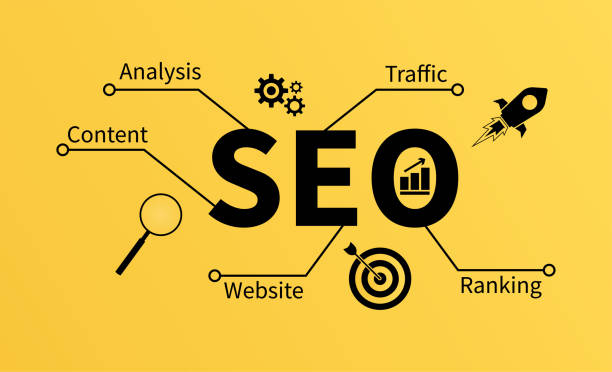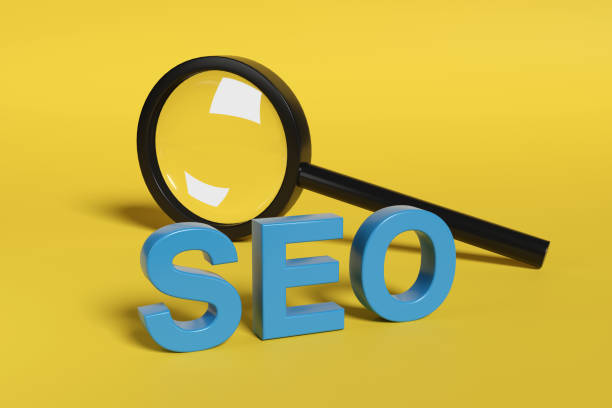What is SEO and Why is it Important?
![]()
In today’s digital world, appearing in the top ranks of search engines like Google is a fundamental difference between the success and failure of an online business.
This is where the concept of Search Engine Optimization or SEO becomes important.
SEO is a set of techniques and strategies used to improve your website’s position in organic (non-paid) search engine results.
This process includes everything from the technical aspects of the website to content quality and link authority.
The importance of SEO is due to increased visibility, free traffic, and brand credibility, which are vital for any business.
A website without proper SEO is like a shop located on a deserted street that no one knows about.
This section provides a comprehensive explanation of SEO fundamentals and answers your basic questions.
Understanding these basic principles is a very important educational step for anyone who intends to succeed in the online space.
Do you dream of a thriving online store but don’t know where to start?
Rasaweb is your comprehensive e-commerce website design solution.
✅ Attractive and user-friendly design
✅ Increase sales and revenue⚡ Get free consultation
Types of SEO: Technical, On-Page, and Off-Page

To achieve a successful Search Engine Optimization (SEO) strategy, a precise understanding of its types is essential.
In general, SEO is divided into three main categories, each playing a complementary role in achieving high rankings: On-Page SEO, Off-Page SEO, and Technical SEO.
On-Page SEO includes all activities you perform within your website to improve its ranking, such as content optimization, URL structure, title tags, meta descriptions, and proper use of keywords.
This section requires a specialized approach to content quality and user experience.
Off-Page SEO refers to activities performed outside your website to increase its credibility and domain authority, such as link building (backlinks) from reputable sites, social media activity, and brand mentions on the web.
Finally, Technical SEO deals with the technical aspects of the website that help search engines easily crawl and index your website; items such as site loading speed, mobile-friendliness, site structure, and the use of structured data.
Each of these components works integrally to form a complete SEO strategy and optimize your website for search engine algorithms.
The Role of Keywords in SEO Strategy

Keyword research and selection are the cornerstone of any successful SEO strategy.
Keywords are the phrases users enter into search engines to find information, products, or services.
A proper understanding of these words and how to use them helps you create content that precisely aligns with your audience’s needs.
This process requires a deep analytical approach, including identifying high-volume keywords, analyzing competition, and understanding user search intent.
Keyword research is not limited to finding high-volume keywords but also includes discovering long-tail keywords, which, although having lower search volume, are often more targeted and result in higher conversion rates.
Using keyword research tools and competitor analysis to identify opportunities is a key guidance.
This critical step in Search Engine Optimization ensures that your content efforts are on the right track and yield the highest returns.
Without appropriate keywords, even the best content might go unnoticed.
Keyword SEO goes beyond mere keyword density and also pays attention to their semantic and practical relevance.
| Stage | Description | Suggested Tools |
|---|---|---|
| 1. Initial Brainstorming |
Initial idea generation based on products/services and customer needs. | Your own mind, Q&A with customers |
| 2. Competitor Analysis |
Reviewing keywords used by main competitors. | SEMrush, Ahrefs, Moz Keyword Explorer |
| 3. Using Specialized Tools |
Finding relevant keywords, search volume, and their difficulty. | Google Keyword Planner, Ubersuggest |
| 4. Keyword Grouping |
Categorizing keywords based on intent and topic. | Excel, Miro |
| 5. Mapping to Pages |
Assigning keywords to specific website pages. | Sitemap, Spreadsheet |
Content Optimization for Search Engines
![]()
After identifying suitable keywords, the next step is to create high-quality content and optimize it for search engines.
Content is king, and this phrase never gets old in the world of SEO.
High-quality content refers to texts that are not only optimized for search engines but also valuable and engaging for users.
This includes proper structuring, using headings and subheadings, short paragraphs, and logical use of target keywords.
Producing thought-provoking content that sparks user curiosity and encourages them to continue reading is of great importance.
Websites that provide fresh, relevant, and in-depth content will not only achieve a better position in search engine rankings but also have a higher user engagement rate.
Optimizing images (using appropriate Alt tags), videos, and other visual elements is also an important part of content SEO strategy.
The ultimate goal is to produce engaging, informative, and yet understandable content for search engine crawling bots.
Adherence to Google’s E-A-T (Expertise, Authoritativeness, Trustworthiness) principles emphasizes the importance of content expertise, authority, and trustworthiness, and is a significant step towards SEO optimization.
Is your e-commerce site ready to attract maximum customers and boost sales? Rasaweb transforms your online business with modern and efficient e-commerce website designs.
✅ Increased speed and improved SEO
✅ Excellent user experience on mobile and desktop⚡ Get a free e-commerce website design consultation from Rasaweb!
Technical SEO and User Experience Improvement

Technical SEO (Technical SEO) , though perhaps less focused on than content and link building aspects, plays a fundamental role in the success of the overall SEO strategy.
This part of SEO focuses on improving the website’s technical infrastructure so that search engines can easily find, crawl, and index your pages.
Factors such as site loading speed, which directly impacts user experience (UX) and ranking, are of high importance.
Slow websites can have a high bounce rate and send negative signals to search engines.
Mobile compatibility is also vital, as Google uses Mobile-first Indexing, and most users use mobile devices for searching.
Furthermore, items such as URL structure, Robots.txt file, Sitemap, Structured Data (Schema Markup), and fixing 404 errors all fall under the category of technical SEO.
A technically optimized website not only helps search engines better understand your content but also provides a positive user experience for visitors.
This specialized approach to optimization provides strong foundations for all other SEO activities and ensures that your efforts will not be in vain.
The Importance of Link Building in Off-Page SEO

Link building or backlinking is one of the main pillars of Off-Page SEO and plays a significant role in determining your website’s authority and ranking in search engines.
When other websites link to your site, it is considered a vote of confidence from Google’s perspective.
The more numerous and higher quality the inbound links (backlinks) to your site, the more reputable and trustworthy search engines will consider your site.
However, link quality takes precedence over quantity; a backlink from a reputable and relevant site is worth far more than dozens of backlinks from irrelevant or spammy sites.
Guidance strategies for link building include creating valuable and shareable content, connecting with bloggers and influencers, and identifying broken link building opportunities.
This process is an explanatory and strategic approach to increasing your domain authority.
Google constantly updates its algorithms to detect spammy and unnatural links, so focus only on acquiring natural and high-quality links.
Effective link building is one of the most challenging yet rewarding aspects of SEO and significantly helps increase your website’s visibility.
Measuring and Analyzing SEO Performance

Without measurement and performance analysis, you cannot know how effective your SEO strategies have been and where improvements are needed.
Data analysis is the heart of any successful SEO campaign.
Tools such as Google Analytics and Google Search Console provide you with vital and analytical data.
Google Analytics allows you to monitor website traffic, user behavior, conversion rates, and traffic sources, while Google Search Console provides information about search performance, crawl errors, inbound links, and the indexing status of your pages.
Key SEO measurement metrics include keyword rankings, organic traffic, click-through rate (CTR), bounce rate, and time on site.
Regular reporting and reviewing these metrics help you make data-driven decisions and optimize your SEO strategy.
Understanding this data and converting it into actionable insights is vital for any SEO specialist and ensures that all your efforts align with your business goals.
This aspect of SEO requires precision and attention to detail to reach your website’s maximum potential.
| Metric (KPI) | Description | Monitoring Tools |
|---|---|---|
| Organic Traffic | Number of visitors arriving from non-paid search results. | Google Analytics |
| Keyword Ranking | The position of website pages for target keywords. | Google Search Console, SEMrush |
| Click-Through Rate (CTR) | Percentage of clicks relative to the number of impressions in search results. | Google Search Console |
| Bounce Rate | Percentage of users who view only one page and then leave. | Google Analytics |
| Dwell Time | Average time users spend on website pages. | Google Analytics |
Google Algorithms and Important Updates

Search engines, especially Google, use complex algorithms that are constantly changing and updating for ranking websites.
Understanding how these algorithms work is vital for every SEO specialist.
Google regularly releases minor updates and sometimes major Core Updates, which can have significant impacts on website rankings.
For example, Penguin updates focused on link quality, and Panda on content quality.
These updates are usually designed with the goal of providing more accurate and useful search results to users.
Following SEO news and understanding the implications of these algorithmic changes enables you to adjust your SEO strategies in time and prevent rank drops.
Search Engine Optimization teams should always be monitoring and employing the best practices to align with Google’s latest guidelines.
This section provides important news information essential for maintaining your position in search results and shows that SEO is a dynamic and evolving field.
Are you frustrated with your online store’s low conversion rate?
Rasaweb, with its professional e-commerce website design, is your definitive solution!
✅ Increase your sales and revenue
✅ Unrivaled user experience for your customers
⚡ Get a free consultation now!
Local and International SEO

For businesses offering services or products in a specific geographical area, Local SEO is of particular importance.
Local SEO helps improve your website’s visibility in search results for location-specific queries.
This includes optimizing Google My Business, acquiring positive customer reviews, and ensuring consistency of NAP (Name, Address, Phone number) information across all platforms.
As a guide, focusing on local keywords and creating region-specific content can direct targeted traffic to your business.
In contrast, International SEO is vital for websites aiming to target audiences worldwide.
This strategy includes using hreflang tags to specify the language and region of your content, proper URL structuring for international domains, and understanding cultural differences in target markets.
Both types of SEO require a specialized approach to achieve their goals, but they are built upon similar principles of Search Engine Optimization.
Whether you are looking to attract customers in a small town or expand your operations to global markets, local and international SEO strategies can help you achieve your goals and effectively increase your visibility.
The Future of SEO and Emerging Trends

The world of SEO never stands still; it is constantly changing and evolving.
With technological advancements and changes in user behavior, emerging SEO trends constantly appear that need to be considered.
One of the most important of these trends is Voice Search.
With the widespread adoption of voice assistants like Siri, Google Assistant, and Alexa, optimizing content to answer users’ conversational questions has become increasingly important.
This requires focusing on long-tail keywords and providing direct, concise answers.
Also, the role of Artificial Intelligence and Machine Learning (AI & Machine Learning) in search engine algorithms, such as Google’s RankBrain algorithm, is increasingly growing.
This means that search engines can better understand user intent and provide more relevant results than before.
These developments call for a continuous educational and engaging approach for those active in the SEO field.
Other trends include video SEO, visual search, and the importance of user experience (UX) as a direct ranking factor.
The future of SEO is moving towards a deeper understanding of user needs and providing exceptionally high-quality and relevant content.
Those who anticipate these changes and adjust their Search Engine Optimization strategies accordingly will be ahead in the competition.
Frequently Asked Questions
| Question | Answer |
|---|---|
| What is SEO? | SEO, or Search Engine Optimization, is the process of increasing the quality and quantity of website traffic by improving the site’s ranking in natural (organic) search engine results like Google. |
| What are the main types of SEO? | SEO is divided into three main categories: On-Page SEO, Off-Page SEO, and Technical SEO. |
| What does On-Page SEO include? | On-Page SEO includes optimizing elements within the website, such as keywords, Title Tags, Meta Descriptions, content, URL structure, images, and internal links. |
| What is Off-Page SEO? | Off-Page SEO refers to activities outside the website that help improve its ranking, such as Backlink Building, social media marketing, and Brand Mentions. |
| What is Technical SEO? | Technical SEO focuses on optimizing the technical aspects of a website to help search engines crawl and index it better. This includes site speed, mobile-friendliness, site structure, Sitemaps, and the Robots.txt file. |
| What role do Keywords play in SEO? | Keywords are phrases users enter into search engines. Proper and targeted use of relevant keywords in content and site elements helps search engines understand your page’s topic and display it for relevant searches. |
| What is a Backlink and why is it important? | A backlink, or inbound link, is a link from one website to another. Backlinks act as a “vote of confidence” from other sites for search engines and play a significant role in a site’s credibility and ranking, especially if they are from reputable sites. |
| What impact does high-quality content have on SEO? | High-quality, relevant, comprehensive, and unique content not only attracts and retains users but also signals to search engines that your page is valuable. This helps improve ranking, reduce Bounce Rate, and increase user time on site. |
| Why is website loading speed important for SEO? | Website loading speed is an important ranking factor for Google. Faster sites offer a better user experience, have lower bounce rates, and are preferred by search engines. |
| Is SEO a one-time process? | No, SEO is an ongoing and long-term process. Search engine algorithms are constantly changing, competition is increasing, and website content also needs updating. Therefore, SEO requires continuous monitoring, analysis, and optimization. |
And other advertising services of Rasaweb Advertising Agency in the field of advertising
Smart Link Building: Designed for businesses seeking user engagement through user experience customization.
Smart Marketplace: An effective tool for improving SEO ranking by optimizing key pages.
Smart UI/UX: A professional solution for increasing sales with a focus on attractive user interface design.
Smart Brand Identity: A creative platform for improving customer acquisition through intelligent data analysis.
Smart Conversion Rate Optimization: An effective tool for digital branding through custom programming.
And over hundreds of other services in internet advertising, advertising consultation, and organizational solutions
Internet Advertising | Advertising Strategy | Advertorial
Sources
Comprehensive SEO Guide on Iran Server
SEO Training on Modir TV
Basic Principles of SEO on Digikala Mag
What is SEO? on SEO Nama
? For your business to leap forward in the digital world, Rasaweb Afarin is with you. With us, in addition to benefiting from specialized digital marketing consultation, you can experience the best website design with a modern user interface for your brand and have a powerful online presence.
📍 Tehran, Mirdamad Street, next to Bank Markazi, Kazerun Jonubi Alley, Ramin Alley, No. 6



